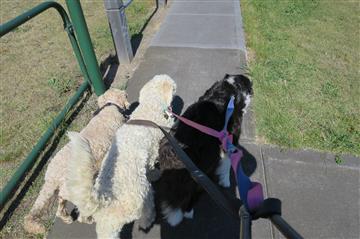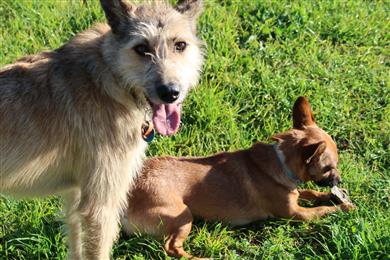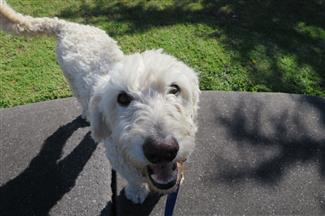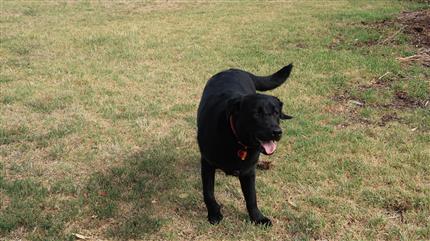Dog training courses will not discuss working with clinical dog problems
 Did you ever wonder about what might be wrong with a dog you just got?
Did you ever wonder about what might be wrong with a dog you just got?
The greet news about dog genetic disorders is that unlike human being, it seems that there are very few mental issues that stop a dog functioning or being trained. That might be because many of the human mental issues are increased by the pressures of society and need to earn a living. Whereas the majority of dogs on earth in urban environments are bought as domestic pets and not expected to work.
In fact most dogs are not fed right or exercised sufficiently to really know what their potential is and how normal they should be.
But I do digress a lot. Below is a list of:
Types of DOG GENETIC INHERITED Disorders & what that means to dog training course work.
- Inherited blood disorders
- Inherited cardiovascular disorders
- Inherited disorders of the urinary and reproductive systems
- Inherited endocrine disorders
- Inherited eye disorders
- Inherited gastrointestinal disorders
- Inherited immune disorders
- Inherited musculoskeletal disorders
- Inherited nervous system disorders
- Inherited respiratory disorders
- Inherited skin disorders
The above list of clinical disorders are nicely categorised by the University of Prince Edward island in Canada. The great thing about this database is that it succinctly categorises the main ailments likely for a dog, and you can then find out more specific information about them. this was a massive joint university project and one very worthwhile for vet clinics and lay people alike.
On their site they say “The goals of the database are to reduce the incidence of inherited disorders in dogs by providing information to owners and breeders, and to facilitate the best management possible of these conditions by providing current information to veterinarians. ”
In dog training terms this means that if you suspect your dog has a physical illness you can help it get better by physical therapy drugs or operations. But you need to know what to look for or at least your vet does. If it appears that your dog has a learning disability or a physical issue, that is a genuine medical condition, you might be able to adapt your training program so as to get the level of dog training you were aiming for.
Ideally such a database would be used in breeding programs to identify genetic issues in breeding dogs and stop breeding with them if the conditions are severe enough.
Again, notice how the database doesn’t have any obvious mental issue category. There are blood disorders, eye disorders, endocrine disorders, nervous system – but none specifically brain related. THIS should show or at least suggest how rare major genetic brain issues are in dogs and breeding in general.
It should also make you realise that any bad behaviour you have in an acquired rescue dog or your own dog you raised since it was a puppy is most likely going to be to do with breed and your training skills OR more likely the fact you have not socialised a dog sufficiently, daily.
THIS is a big thing missing from many people’s schedules. I would rather have a 100% friendly dog (social to human and dog too) any day than a 100% trained dog (that is not friendly), and yes, these things are usually mutually exclusive. Many dog trainers think it beneath them or their dogs to socialise daily, when in fact learning to be social daily is far more important to a dogs mental well being than being trained to repeat a human designed task over and over.
How to reduce the chance of inherited clinical disorders affecting dog training
Again this is going against the grain of many trainers and breeders, but if you can’t trust your breeders 100% to ensure that the dogs they use are free from major dog clinical disorders, it might be a better option to get a rescue dog that has several breeds in it, and is acting relatively NON crazy.
This can be difficult if it has been in rescue pounds for a long time, or if it was mistreated, but you will also see on the clinical site that they have clinical issues separated into dog breed types. Meaning that interbreeding has often created a strong chance of one major clinical health issue or other with almost every breed. And breeding two of these pure breed dogs together is not going to lower the chance of the offspring having it.
Rescue groups will only go so far into the expense of testing a dog for genetic disorders or major clinical problems – if they don’t result in obvious physical signs its often in the best interest of getting a dog a new home to breeze over ‘minor’ health issues anyway.
If you want a dog to live to the oldest age it can, to be healthy and happy, no matter its staring state, it means good meat based food and daily off lead walks with other social dogs. A happy dog like a happy human, starts with the right nutrition and friends.
Then you can go to your dog training course and dog trainer and with positive rewards ALSO have your dog trained.



